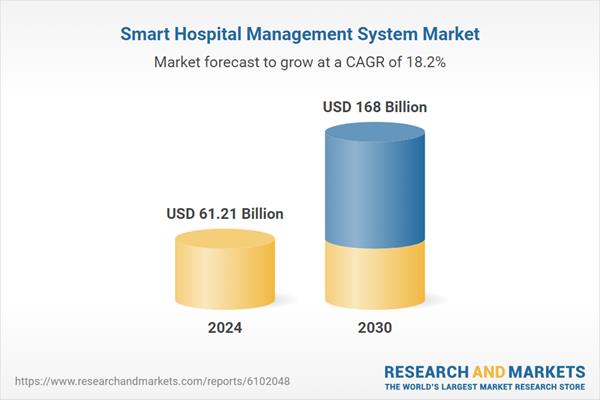Speak directly to the analyst to clarify any post sales queries you may have.
10% Free customizationThis report comes with 10% free customization, enabling you to add data that meets your specific business needs.
The rising prevalence of chronic diseases, aging populations, and pressure on healthcare infrastructure are accelerating the adoption of intelligent hospital systems. Investments from both government and private sectors into digital healthcare infrastructure are further fueling growth, particularly in both developed nations and emerging economies. Software components such as EHR and HIS dominate the market, while IoT stands out as the fastest-growing technology. Cloud-based models are gaining preference for their scalability and cost-efficiency, while key applications such as inpatient and outpatient management, pharmacy automation, and revenue cycle optimization continue to drive demand across multispecialty and super-specialty hospitals.
Key Market Drivers
Rapid Adoption of IoT in Healthcare
The widespread integration of Internet of Things (IoT) technology is significantly advancing smart hospital management systems. IoT facilitates connectivity between patients, medical equipment, and hospital systems, enhancing efficiency and care quality. Over 60% of hospitals worldwide have adopted IoT-enabled tools for patient and asset monitoring.The use of Real-Time Location Systems (RTLS) has reduced equipment loss by up to 35%, while IoT integration in HVAC systems has achieved energy cost savings of approximately 20%. Smart beds and IoT-enabled wards have demonstrated a 30% improvement in patient turnover and 25% reduction in bed-related errors. These implementations reduce manual workloads, support proactive equipment maintenance, and improve both operational performance and patient care outcomes.
Key Market Challenges
High Initial Investment and Operational Costs
One of the primary challenges hindering adoption is the high cost associated with implementing smart hospital management systems. Building the required infrastructure - such as IoT devices, AI platforms, smart sensors, and software integration - demands significant capital expenditure.Hospitals must invest in advanced hardware, secure networks, RFID systems, and servers. Software licensing, cloud deployment, and system upgrades add to long-term operational expenses. Moreover, customization to align with legacy systems can extend implementation timelines and increase financial strain. Smaller hospitals and facilities in developing countries often lack the financial capacity for such investments, and public healthcare institutions may face long ROI periods, delaying their digital transformation initiatives.
Key Market Trends
Expansion of Remote Patient Monitoring and Virtual Care Platforms
As healthcare shifts toward value-based and patient-centered models, remote patient monitoring (RPM) and virtual care are becoming integral to smart hospital systems. These platforms enable hospitals to monitor patients outside clinical settings, improving chronic disease management and reducing readmission rates.Wearables, mobile apps, and connected sensors track vital signs such as heart rate and oxygen saturation, transmitting real-time data to hospital systems. Integration of RPM has shown to reduce readmissions by up to 45% and increase medication adherence by 30%. Hospitals are also expanding virtual consultation services, especially in remote or underserved areas, to alleviate strain on physical infrastructure. By integrating RPM with hospital management systems, seamless data exchange between providers and patients is enabled, boosting clinical efficiency and reducing operational burdens.
Key Market Players
- Siemens Healthineers
- Cerner Corporation
- Philips Healthcare
- GE HealthCare
- Altera Digital Health
- Medtronic
- McKesson Corporation
- Merative
- Epic Systems Corporation
- Oracle Corporation
Report Scope:
In this report, the Global Smart Hospital Management System Market has been segmented into the following categories, in addition to the industry trends which have also been detailed below:Smart Hospital Management System Market, By Technology:
- Artificial Intelligence
- Internet of Things
- Big Data & Analytics
- Machine Learning
- Others
Smart Hospital Management System Market, By Component:
- Hardware
- Software
- Services
Smart Hospital Management System Market, By End-User:
- Multispecialty Hospitals
- Super-Specialty Hospitals
- Clinics & Ambulatory Surgical Centers
- Academic & Research Institutes
Smart Hospital Management System Market, By Region:
- North America
- United States
- Canada
- Mexico
- Europe
- Germany
- France
- United Kingdom
- Italy
- Spain
- South America
- Brazil
- Argentina
- Colombia
- Asia-Pacific
- China
- India
- Japan
- South Korea
- Australia
- Middle East & Africa
- Saudi Arabia
- UAE
- South Africa
Competitive Landscape
Company Profiles: Detailed analysis of the major companies present in the Global Smart Hospital Management System Market.Available Customizations:
With the given market data, the publisher offers customizations according to a company's specific needs. The following customization options are available for the report.Company Information
- Detailed analysis and profiling of additional market players (up to five).
This product will be delivered within 1-3 business days.
Table of Contents
Companies Mentioned
- Siemens Healthineers
- Cerner Corporation
- Philips Healthcare
- GE HealthCare
- Altera Digital Health
- Medtronic
- McKesson Corporation
- Merative
- Epic Systems Corporation
- Oracle Corporation
Table Information
| Report Attribute | Details |
|---|---|
| No. of Pages | 185 |
| Published | June 2025 |
| Forecast Period | 2024 - 2030 |
| Estimated Market Value ( USD | $ 61.21 Billion |
| Forecasted Market Value ( USD | $ 168 Billion |
| Compound Annual Growth Rate | 18.1% |
| Regions Covered | Global |
| No. of Companies Mentioned | 10 |









